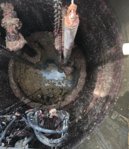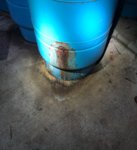






On March 23 of 2021, Water Systems Inc. of Lexington, SC traveled to Summerton to do a complete assessment of their water systems at the behest of former volunteer Town Administrator Beth Phillips. This test revealed more than 120 unique problems with Blackman Laboratory ran water system.
The entire report detailed several issues with each individual well, storage tank, lift station, and wastewater treatment facility in the Summerton, Goat Island, Sigfield, Haynesworth Mill, Gin Pond Shores, and Foxboro systems, etc.
Shortly after, in May, the South Carolina Department of Health and Environmental Control released four consent orders to the Town of Summerton after a meeting on May 7, detailing the issues they found with the Sigfield, Haynesworthy Mill, Gin Pond Shore, and Goat Island water systems, and the deadlines that the owners had for fixing these problems: September 15.
So, what is a consent order? Let’s take a look at the first few paragraphs of the consent order for the Sigfield System:
“The Town of Summerton (Owner) owns and is responsible for the proper operation and maintenance of the public water system No. 1450006 (PWS) that serves the customers of Sigfield located in Clarendon County, South Carolina.
An inspection of the PWS by South Carolina Department of Health and Environmental Control (Department) staff revealed that the Owner failed to properly operate and maintain the PWS, and failed to develop an Emergency Preparedness Plan.”
The consent order goes on to detail the specific problems with the Sigfield system before outlining exactly what needed to be done, and when it had to be done. There were 19 unique problems found to be in violation of SCDHEC standards in the Sigfield system alone, and these problems had to be remedied by September 15. SCDHEC also details their meeting with town council:
“On May 7, 2021, Department staff held an enforcement conference with the Owner’s representatives Mac Bagnal (Mayor - Town of Summerton), Beth Phillips (Town Administrator - Town of Summerton), Doug Clary (President - Hybrid Engineering, Inc.), Rami Alcheikh (Design Engineer - Hybrid Engineering, Inc.), Jay Kates (President Water Systems, Inc.), Mike King (Improvements Manager - Water Systems, Inc.), and Van Sealey (Site Manager/Project Coordinator Water Systems, Inc.) to discuss the violations. The possibility of a Consent Order was also discussed.”
The consent order also detailed the fines that would be faced by the town should these deadlines not be met:
“THE PARTIES FURTHER STIPULATE that the Owner shall pay a civil penalty of eight thousand dollars ($8,000.00) should it fail to comply with any requirement pursuant to this Consent Order, including any implementation schedule approved by the Department. Such penalties shall be due and payable upon written notice to the Owner. All penalties due under this paragraph shall be made payable to the South Carolina Department of Health and Environmental Control within thirty (30) days of notification by the Department. The stipulated penalties set forth above shall be in addition to any other remedies or sanctions which may be available to the Department by reason of the Owner’s failure to comply with the requirements of this Order. The Department’s determination that the requirements have not been met shall be final.
With these goals in mind, let's take a look at some of the individual problems faced by systems under DHEC consent orders.
Sigfield
Sigfield makes up the largest water system under a consent order by SCDHEC. It is comprised of two wells and 88 taps and serves a primary population of 230 and a secondary population of 55.
The Sigfield water system had several sanitation problems, mostly including maintenance issues and equipment failures.
“Facility Maintenance was rated “unsatisfactory” in that the insulation inside the well covers was deteriorating, black widow spiders were nesting inside the well covers, numerous ant mounds were found around both wells, and the chemicals used to treat for ants were found near both wells,” reads the DHEC consent order for this well.
Another major issue of note is the record-keeping for these wells. A water operator's job entails going to each part of every system and checking, maintaining, and testing daily. Meaning every day, there should be a water operator at each part of each system making sure that everything is in working order. According to the recently contracted water operator, Jay Kates, the lack of maintenance over several years is what is causing all of the current problems.
“This is nothing that just happened overnight,” said Kates. “It’s lack of operational procedures [and] lack of maintenance procedures [from] whoever was responsible for operating [these systems.]”
Gin Pond Shores
The Gin Pond Shores community is built on a small stretch of land lining lake Marion, south of Summerton. The water system that serves them consists of one permanent well, one emergency well, one 6,000 gallon service tank, and 59 taps, serving approximately 70 people. Within this system, there were 18 unique problems found.
The Water Systems, Inc report showed these problems:
No water meter
No screen on vent
Not secure
No electrical conduit
No handle on gate valve
Ant poison around well casing Tank coatings are failing
No air compressor
Power pole damaged
Floor inside building damaged
No vent pipes.
Sanitary seal open
No screens on blow-offs
The same September 15 deadline was given to this water system, as well as the $8,000 fee that the town would have to pay if DHEC found their systems unsatisfactory at the time of the next inspection.
Haynesworth Mill
Haynesworth Mill is another system located by Lake Marion. The system consists of a permanent well, six bladder storage tanks, and eight taps, serving sixteen people.
Though this is a much smaller system than the two previously mentioned, there were still 18 unique problems found in the April 8 DHEC survey.
“Source protection from contamination was rated “unsatisfactory” in that the sanitary seal was in disrepair, the insulation in the well house was deteriorating, the well pad was cracked a rat was living in the well house, a pipe surrounding the well casing was holding water, around the well casing, and the blow-off did not have a screen,” reads the first item on the consent order.
There were also issues with logging at this well, with DHEC noting that they had not received any documents informing them that they had been checked or maintained.
Water operators keep rigorous notes and log-books detailing everything they do to maintain water systems, and these problems were severe enough that they would not have been simply overlooked.
“Out of those [120+ problems found in the Water Systems, Inc. report, you might miss half-a-dozen,” said Kates. “These were stand-out. I really didn’t have to dig to find them.”
Goat Island
The Goat Island community is located at the end of Washington Davis Road next to Lake Marion. For years, they have been experiencing water issues according to local business owner Tammy Johndrow. The system there has 98 taps and serves 40 primary customers and 250 secondary customers. It is also worth noting that this system is connected to the Sigfield system.
“People have been going to the hospital with stomach issues for months,” said Johndrow to the Times for an article in April. “We have had two cases of twisted bowels since February, cases of rashes, and a few dead pets.”
Since that article was published, DHEC has also released a consent order for Goat Island, finding 18 unique problems with the system.
“Storage Maintenance was rated “unsatisfactory” in that the storage building was in disrepair, the storage tank was in disrepair, and there were no storage tank inspection reports available for department review,” read the DHEC consent order over Goat Island.
This consent order, like the other three, notified the town of the $8,000 penalty that would be faced should they not fix these issues.
Show Your Work
One of the most glaring issues outlined in each consent order is the lack of record-keeping, which indicates that the former operator of the system, Blackman labs, was not giving proper attention to these systems.
Each water system shares several problems in the consent order, one of them being an unsatisfactory score on record keeping and monitoring. A record sheet was recorded in the Water Systems, Inc. report, which shows several discrepancies with system maintenance and testing.
This in itself presents a huge problem. In order for water systems to be properly upheld and provide clean drinking water to the residents that they serve, they must under all circumstances be checked and maintained daily. Anything less can and will result in what has happened to the residents of these four systems.
Clean Up
In a January meeting of the Town of Summerton Council, there was a decision made to bring Blackman Labs back on as the water operator for the Town’s water system, with Chalmer Stukes, a council member, serving as the operator. This decision was not made without opposition. Two members of council voted instead to bring on Water Systems, Inc. However, they were out-voted. Flash forward to present day, and Water Systems, Inc. is currently handling the water operation in the Town of Summerton. Since then, Jay Kates and his team have been trying to clear up all of the problems in the SCDHEC consent order.
“85% of the problems have been addressed,” said Kates. “Just about all of the problems with those four water systems have been addressed.”
There is a scheduled follow-up inspection on the 27th of October, and Kates is hopeful that they will pass.
“They’re going to inspect everything that was supposed to have been done, and we are hoping to come out on top,” said Kates.
As for the cost, Kates estimates that to fix every problem found in their various water systems, it would cost the town somewhere around $625,000. This is a high number considering they budgeted only $39,500 for maintenance in their July 1 Water/Sewer budget.
Thankfully for the town, there are services and grants to help soften the blow of that six-figure price tag. In August, they were given $150,000 from County Council. For now, the residents simply have to remain hopeful that the shift in water operators will be enough to fix the issues that they have been experiencing.